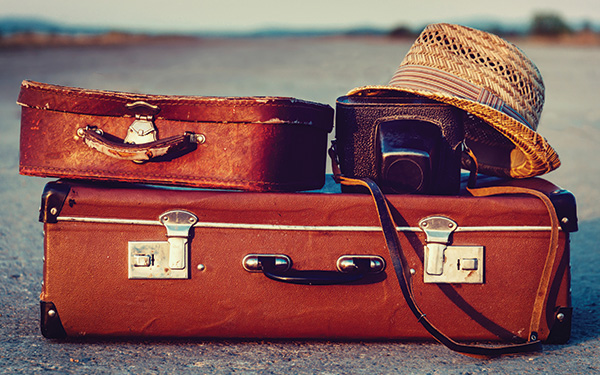Travel hacks
The student guide to going places
 |
Going somewhere special this summer? Most students want to travel, according to a recent Student Health 101 survey. And you’re pretty clear that the benefits of travel go way deeper than a tan.* “Traveling is a wonderful form of education,” says Daniel R., a student at San Bernardino Valley College, California. “Travel encourages me to appreciate the unknown while recognizing the familiar,” says Joe Foley, a rising first-year student at American University in Washington DC, who in 2014 became the youngest ever National Geographic Traveler of the Year.
What’s blocking your exit route?
Not surprisingly, by far the biggest barrier to travel is cost. “It can cost a lot of money, and you have to find time away from work, school, and family,” says Kristen C., a student at Indian Hills Community College, Iowa. In our survey, 93 percent of students who responded said lack of funds was a barrier and 62 percent were concerned with time. Only 2 percent said they were uncomfortable with the prospect of unfamiliar places.
*And by the way, there’s no such thing as a healthy tan. Use SPF 30+, people.

Your top 5 travel experiences so far
- Beach vacations
- Outdoor adventures, e.g. kayaking and hiking
- Volunteer projects (US)
- Organized guided tour (US)
- Backpacking trips (US)
Your top 5 destinations
- Europe
- Mexico
- Florida
- California
- Canada
Source: Student Health 101 survey, February 2015
Your barriers to travel
“It’s hard to overcome stereotypes of being American in a foreign country.”
—Kristin R., third-year graduate student, Southern Illinois University, Carbondale
“The paperwork for international travel. The visas help keep track of visitors but at the same time it’s like having to complete a totally different job just to earn the right to relax from your normal one.”
—Tyler S., third-year student, University of the District of Columbia
“When you travel, it seems like you need another vacation when you get home to wind down from it all.”
—Lisa S., part-time student taking online courses, Ridgewater College, Minnesota
“Lack of knowledge within new environment can be dangerous if you’re unaware of crime, culturally suspicious activities, and behaviors.”
—John R., second-year student, Community College of Denver
“I’ve known neighbors who traveled extensively, but I never really thought about going outside the state of Mississippi.”
—Virgie R., second-year student, Jackson State University, Mississippi
“Being away from work means not getting paid.”
—Matthew R., part-time student, Madison College
“You might have immediate discomfort (bug bites, a language barrier, fear of the unknown) because you can’t plan for the unexpected on the road.”
—Megan C., second-year graduate student, San Diego State University, California
What you love about travel
“The cost of taking an airplane is a huge hassle. However, what’s living if you don’t spend your money to experience new things and go to new places?”
—Steven M., fourth-year student, University of Massachusetts Amherst
“How resourceful can you be when you’re out of money and 4,000 miles away from home? Do you panic? Do you run to the consulate? Do you go native? You learn that you can wash your undies in a hotel bathroom in Rome without embarrassment. You realize that street food really is the most delicious cuisine you’ll ever stuff in your face. Travel will grind you down to your truest self. Whether that is good or bad really is up to the person. In addition, foreign candy is legit way better. So the downside is you’ll never be happy with a Snickers™ again.”
—Lori T., third-year graduate student, San Diego State University, California
“Traveling gives you more consideration of other cultures, as well as your own. It creates a better perspective on domestic and world events.”
—Mark S., second-year graduate student, Portland State University, Oregon
“I love airports, planes, train stations, subways and underground metro systems, meeting new people, and dancing the night away.”
—Sarah A., third-year student, Saint Mary’s University, Minnesota
“You can expand your world by going somewhere new or going somewhere again and being open to the changes. You meet new people, and you are able to grow spiritually, mentally, and emotionally.”
—Bree E., part-time student, Tulsa Community College
“Travel experiences are built by the little things. The smiles, the first bite of a foreign country’s food, the hostel chitchat. Although the globalized world of Facebook, the Golden Arches, and American TV shows exists in every major city, the local cultures remain vibrant. The world today is as fascinating as it’s always been, and in most places it’s safer than ever to be a tourist. Travel gives us the thrill of adventure and somewhere new while reminding us of our shared humanity across cultures and encouraging us to push our horizons.”
—Joe Foley, rising first-year undergraduate, American University, Washington DC; National Geographic Traveler of the Year 2014
“We grow more by experimenting more.”
—Narmin B., second-year student, Saddleback College, California
“Travel has nothing but benefits because it opens the mind and frees you from the cage of your normal day-to-day life.”
—Nicolas G., first-year student, Tulsa Community College
“It’s amazing to see how different things can be, even somewhere else in your own country—the cuisines and values.”
—Linda L., first-year graduate student, Simmons College, Massachusetts
Stuff you might not think of
Before you go
- Check which currencies are performing badly against the dollar—your money buys more there.
- Apply early for a passport. Here’s how
- If you need vaccinations, check with your school to see if the health center provides them.
- Check the insurance that comes with your credit card. Check your health plan for international coverage too.
- Let your bank and credit card company know your travel plans so your account isn’t flagged for fraud and possibly blocked.
When you go
- Search online for free stuff to do in any tourist-friendly city (e.g., “Montreal free”).
- Electronic guidebooks and maps (not books) reduce the schlep factor. Use Google maps offline by typing “OK maps” in the search bar; the current area will be saved.
- Check the comments on Foursquare for passwords of free wi-fi in local shops and cafes.
- Keep your electronics charged. If you’re going international, bring a converter outlet plug.
How to land cheap flights
- Flexible fliers get the best last-minute fares; be open to a variety of destinations.
- Use a travel search engine: ThriftyNomads.com recommends Skyscanner, Hipmunk, Google Flights, and several others. Here’s how
- Try searching for airfare deals around 1 a.m. The unsold deals from the day before will be reposted.
- Before buying any ticket to anywhere, check for student discounts.
- Keep your online searches incognito to find the lowest price. Here’s how
- Don’t make the mistakes everyone else makes. Here’s how
- Be smart about budget airlines. Here’s how
- Get cheaper domestic flights in other countries. Here’s how
- Find the best way to get where you’re going. Rome2Rio
Spend less to go farther
- Kayak’s Explore: Find out how far your money can take you
- Adioso: Sort fares from your city by price
- Get the Flight Out: Free iOS app. The cheapest fares leaving from your city today
- STA Travel: Expert travel itineraries and student discounts
- Student Universe: Lower-cost airfares for students
- One Travel: Cheaper flights for students
Cheap digs
Hotels, hovels, homes, & habitats
- Hovelstay: Save money with downmarket digs
- CouchSurfing: Be a guest at someone’s house; check out the reviews
- Friends of Friends Travel: Find a travel buddy and contacts at your destination
- Trip Advisor: Recommendations and red flags from real people
- AirBnB: B&Bs, apartments, and spare rooms for rent. Try to negotiate the price.
- Hostels.com: 35,000 hostels in 180 countries (including US)
- Hostelling International USA: Youth-geared US hostels
- Hotels.com: Need a place tonight? Deals start at 50 percent off
- Reserve America: Beautifully habitable campgrounds across the US
- National Park Service: America’s best idea (really—the best)
- Recreation.gov: Way more to do than you realized

Why travel?
Here’s how to talk yourself (and others) into it
Better on the job
People who take advantage of their vacation days are more productive, experience less stress, and have improved attitudes after returning to their jobs, according to a 2014 report by Oxford Economics for the US Travel Association.
Go global
Students expect travel to make them more “global”—i.e., expand their knowledge, perspective, and social and cultural connections, according to a small study at California Polytechnic State University (2010).
Run free
Students associate travel with freedom; e.g., a break in academic and work expectations, a boost to emotional health and relaxation, and an opportunity to experience nature (CPSU study).
Step it up
Students who have taken a gap year perform better academically and report greater job satisfaction than do those who haven’t, research suggests. Gap year experiences can reignite a passion for learning and influence personal goals and values, including career paths, say Karl Haigler and Rae Nelson in The Gap-Year Advantage (Macmillan, 2005).
Stay healthy
Physically-active leisure helps us maintain physical and mental health, especially during times of stress, according to a study of 20,000 people in the Canadian Journal of Public Health (2001).
Get creative
Knowing people from other cultures makes us more creative in tasks that draw on multicultural influences and more receptive to new ideas from outside our own experience, suggests a study from Harvard Business School (2011).
Love your life
Even the anticipation of vacation travel makes us feel good about our lives and health, according to a 2002 study in the Journal of Vacation Marketing.







